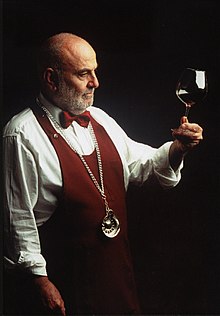 Bl. Pope John XXIII once said that men were like wine, some turn to vinegar and the best improve with age. Relying on God for His Divine Assistance, I hope that I might become a wine pleasing to Him. Secondly, the wise men are those who can taste the difference between good and bad wine, figuratively speaking.
Bl. Pope John XXIII once said that men were like wine, some turn to vinegar and the best improve with age. Relying on God for His Divine Assistance, I hope that I might become a wine pleasing to Him. Secondly, the wise men are those who can taste the difference between good and bad wine, figuratively speaking.Don't believe me? The word wisdom in Latin is "sapientia." The root of the word is "sapio, sapere" meaning to taste or understand. The two notions tasting and understanding are inextricably connected. In the same way that a person who has had many experiences in life and taken the time to understand those experiences and why they happened the way they did, a person who has drunk many different wines and taken the time to understand the subtle differences can become a true sommelier. This sommelier when asked, "What wine ought I to have with this meal?" can easily recommend the perfect wine. The wise man, similarly, can recommend to the inexperienced an appropriate course of action.
The skill of being able to taste the subtleties of food and drink has always been the perfect analogy for wisdom. The most famous taste experts are those of wine, the sommelier or wine steward. For this reason, I found wine á propos to the name of this blog and "like" fits á double entente to make the title mean two quite inextricably related things, men appreciate wine and men are similar to wine. And if this is the case, then it follows that men who appreciate wine in the figurative sense are men who improve with age.
Cheers!

I'm excited to see what turns up here! (Also, I think you meant "double entendre." An "entente" is like a cease-fire.)
ReplyDeleteThanks for the comment, Lindsay. "Double entendre" is a very common expression in English, you're right. In fact, it is so common and often carries with it the connotation of 'risqué' comment disguised by a word or phrase. "Double entendre" is, however, a corruption of the French phrase, "á double entente," where "entente" is better translated as understanding. The 'cease-fire' kind of understanding is usually called, an "entente cordiale," or 'cordial understanding, i.e. an understanding between friends,' and in this way is an agreement or cease-fire. I specifically used, the word "entente" and I'm glad you caught the difference. I have looked into the difference in the past and most dictionaries, which contain etymologies, highlight that 'entendre' is a corruption of 'entente.'
Delete